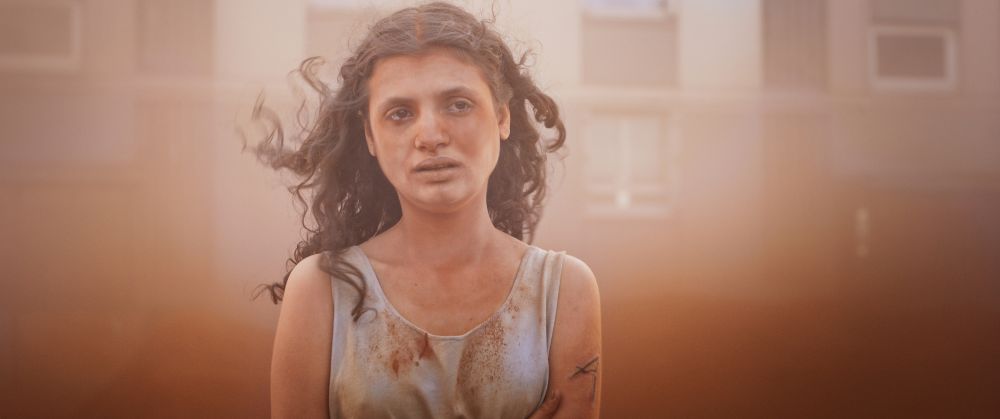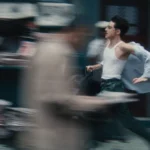Palme d’Or winner Julia Ducournau returns with fresh meat in Alpha, a twisted and complicated tale of familial love and stigma centred around a feisty thirteen year old. If in this somewhat “coming-of-age” trilogy, Grave (Raw) was university and Titane was young adult, Alpha is certainly about growing up as a tween, encompassing everything from rebellion against parental authority to first loves in dingy school bathrooms. While its eponymous heroine also suffers the hardships of bullying and seclusion, Ducournau has with Alpha somewhat departed from her usual fascination with the grotesque and flesh, and recoils from the screen are kept to a minimum here. Its real pull here is not the stimulation of disgust, but rather an intriguing premise and some excellent performances from its central trio. But while Alpha has a lot to play for, its focus always feels just a little off.
Mélissa Boros stars as Alpha, who comes home from a party with an aggressively inflamed “A” tattooed on her upper arm. Her mother (Golshifteh Farahani), a doctor, is immediately alarmed, no less because a mysterious virus is currently doing the rounds in her hospital. The symptoms? Patients slowly turn into marble until their hearts stop. As Alpha does tests, and her schoolmates grow suspicious of her, her homelife is also destabilised by her estranged uncle Amin (Tahar Rahim), who suddenly shows up to live with them.
Alpha’s mysterious virus is an intriguing, original one, though certainly not what would typically fit with the body horror Ducournau has come to be associated with – as the marble settles over, so too do the chills down the spin, as a needle enters the flesh or nail scratch at sensitive skin. Ducournau has alluded to a metaphor for the AIDS crisis and the ostracization experienced by patients – “we know nothing”, says the headmaster when he brings Alpha and her mother in to alert them that parents have expressed worry about their children’s safety. “We know some things,” retorts the mother. Ducournau here aptly depicts a time of uncertainty, worsened by fear and misinformation, and in which the most selfish and ugly parts of human nature take precedence – Alpha is consequently ostracized, avoided, locked in the changing rooms to prevent her from entering the swimming pool. But, she is not one to mess with – Robos here makes the character her own, a vision of steadfastness and childlike belligerence that renders her a particularly difficult target.
What Alpha film suffers from predominantly does not concern its characters, but rather its script, and the feeling that there are in fact two bundled up into one. The opener is of course the aforementioned virus, and the impact on family life as Alpha’s mother becomes progressively more overwhelmed at the hospital. The body horror that is present in Alpha in fact is a lot more circumstantial than individual, as a particularly efficient scene sees her descend into a crowd of patients and their relatives pleading for help – this is claustrophobia filmed at its best, deeply uncomfortable, chilling without any of the flesh. Meanwhile, Alpha witnesses first hand the effects of the virus on the body – her soft-spoken English teacher’s (Finnegan Oldfield) partner, who she meets in the hospital waiting room, is quickly succumbing to it. Ducournau’s latest may have been more efficient had it chosen to stick solely to this – yet a third of the way through, it introduces perhaps its most important character, Amin. A recovering (or not) drug addict, his needles intertwine with Alpha’s nurse’s (Emma Mackey) – does it have anything to do with the virus? Is he a potential survivor, a solution, as a flashback seems to suggest? At the midway point, both stories grossly clash in a confusing parallel universe plot point, as Alpha grows closer to Amin and revisits the past, a past in which she used to know him well – they begin to move together, in illness, tossing and turning in the middle of the night in unison, an eerie dance their mother/sister must watch. Farahani is truly exceptional as a woman hell bent on finding a solution to a problem that, seemingly, has none. Her devotion to keeping her brother alive is truly remarkable – but it is Rahim as Amin that distinguishes himself as the focal point and force of Alpha. Having lost a lot of weight, his skeletal body, bones protruding from his skin, harsh jawline, shaking fingers pulling at a cigarette, are almost emblematic of the Ducournau universe. He is a man who does not want to live, without explanation – but his sister, in past, present and future, has diligently kept him with her. At times, it almost seems like the brother-sister relationship takes precedence over the eponymous heroine. The sister’s commitment and the brother’s love are truly beautiful emotions to watch and navigate – and though it is perhaps not the Ducournau we have become used to, it nevertheless feels like the beginning of something new.
Alpha screened at the London Film Festival.





